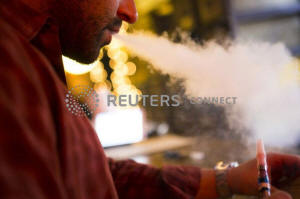|
Juul loses home turf as San Francisco
bans e-cigarette sales
 Send a link to a friend
Send a link to a friend
 [June 26, 2019]
By Chris Kirkham, Uday Sampath Kumar and Jane Lanhee Lee [June 26, 2019]
By Chris Kirkham, Uday Sampath Kumar and Jane Lanhee Lee
(Reuters) - San Francisco will become the
first major city in the United States to ban the sale of e-cigarettes as
officials look to control the rapid uptick in teenage use of nicotine
devices made by companies such as Juul Labs Inc.
The San Francisco Board of Supervisors approved the ordinance on
Tuesday, banning the sale and distribution of e-cigarettes until they
have approval from the U.S. Food and Drug Administration.
States and cities across the United States have already moved to ban
flavored e-cigarettes and raise the legal age for purchasing tobacco
products to 21, but San Francisco's new approach is the most
far-reaching yet.
No other major cities have proposed a similar hardline ban, though San
Francisco's move could lead others to consider it.
The city council in Beverly Hills, California, this month approved a ban
on the sale of tobacco products beginning 2021, though it carved out
exceptions for some cigar lounges and hotels.
Juul, which is based in San Francisco and has grown to be the dominant
e-cigarette maker in the United States, has been at the center of the
debate. As its sales soared over the last two years, so did its
popularity among teenagers.

Federal data last year showed a 78% increase in e-cigarette use among
U.S. high schoolers, and state and local lawmakers have been grappling
with how to regulate Juul and other similar products.
San Francisco City Attorney Dennis Herrera, who spearheaded the
ordinance earlier this year, praised the move and said it was necessary
because of what he called an "abdication of responsibility" by the FDA
in regulating e-cigarettes.
E-cigarettes have existed in a regulatory gray area for years. Its
makers originally faced a 2018 deadline to submit applications to the
FDA to sell products, but the deadline was pushed back to 2022.
Amid the surge in teenage use, the FDA in March moved up that deadline
to 2021. A separate court case from anti-tobacco groups may force the
FDA to set an earlier deadline.
"This lack of clarity is causing tremendous confusion at the same time
that a whole new generation of young people are getting addicted to
nicotine," Herrera told Reuters. "The explosion in youth use and the
health risks to young people are undeniable."
San Francisco Supervisor Shamann Walton, who sponsored the ordinance,
said he has been constantly hearing from young people about e-cigarettes
and "how readily available they are in schools, the fact that they're
easily hidden from educators." After Tuesday's vote, Juul spokesman Ted
Kwong said the ban "will drive former adult smokers who successfully
switched to vapor products back to deadly cigarettes, deny the
opportunity to switch for current adult smokers, and create a thriving
black market instead of addressing the actual causes of underage access
and use."
He said the company has already taken steps to prevent underage use and
has proposals of its own to prevent sales to minors in the city.
[to top of second column]
|

A customer puffs on an e-cigarette at the Henley Vaporium in New
York City December 18, 2013. REUTERS/Mike Segar

Juul, in which Marlboro maker Altria Group has a 35% stake, has
pulled popular flavors such as mango and cucumber from retail store
shelves and shut down its social media channels on Instagram and
Facebook.
FDA spokesman Michael Felberbaum declined to comment on the San
Francisco ban, but said the agency is "committed to continuing to
tackle the troubling epidemic of e-cigarette use among kids,"
including limiting access to flavored e-cigarettes and cracking down
on companies and retailers who sell to minors.
E-cigarettes are generally thought to be safer than traditional
cigarettes, which kill up to half of all lifetime users, according
to the World Health Organization, but the long-term health effects
of the nicotine devices remain largely unknown.
Bruce Colbert, who was at a tobacco retailer called the Smoke Shop
in San Francisco, said the ordinance will harm people like him who
are trying to stop smoking cigarettes.
"You can get high. You can get drunk, too. But you can't vape to cut
back on your cigarettes," he said. "Either I go back to smoking
cigarettes full time, or go across the Bay and go somewhere else. No
big deal."
San Francisco city officials last year approved a ban on flavored
tobacco and e-cigarette liquids, a move upheld by voters.
Juul last month filed paperwork in San Francisco for another ballot
measure that experts say would make the flavor ban and Tuesday's
e-cigarette ban unenforceable.
Juul spokesman Kwong disagreed that the ballot initiative would
affect the flavor ban, but said it would supersede the e-cigarette
ordinance approved on Tuesday.
The ballot measure, if approved, would put in place regulations
favored by Juul, which it says would "ensure that underage access
and use is addressed comprehensively but adults aren't driven back
to cigarettes."

The e-cigarette ban will go into effect early next year, according
to the city attorney's office, and will apply to both online and
brick-and-mortar sales in San Francisco.
City officials also passed a separate ordinance prohibiting the
manufacture and distribution of all tobacco products on city
property.
(Reporting by Uday Sampath in Bengaluru, Chris Kirkham in Los
Angeles and Jane Lanhee Lee in San Francisco; Editing by Arun Koyyur)
[© 2019 Thomson Reuters. All rights
reserved.]
Copyright 2019 Reuters. All rights reserved. This material may not be published,
broadcast, rewritten or redistributed.
Thompson Reuters is solely responsible for this content. |